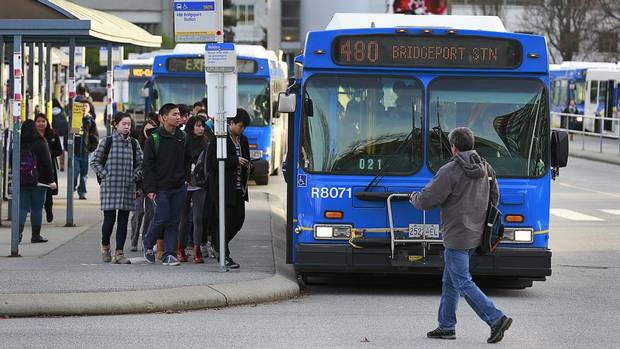
Metro Vancouver is facing a critical choice this spring. From March 16 to May 29, 2015 residents of the region will have the chance to decide on future investments in public transit with the Metro Vancouver Transportation and Transit Plebiscite.
The referendum is a direct result of changes in transportation governance. In June 2014, there were changes to regional transportation authority TransLink’s governance model. Two groups now govern TransLink: the Mayors’ Council and the TransLink Board of Directors.
- The Mayors’ Council is made up of representatives from the 21 municipalities in the transit service region, Electoral Area A (UBC campus and Musqueam lands), and the Tsawwassen First Nation. The Council appoints the majority of members on the Board of Directors and approves long-term transportation strategies (≥ 30 years), 10-year transportation investment plans, first-time short-term fares and short-term fare increases, changes in customer satisfaction survey processes, changes in customer complaint processes, TransLink’s Executive Compensation Plan and director compensation levels, and oversees sale of major facilities and assets.
- The Board of Directors includes nine members appointed by the Mayors’ Council and up to two members appointed by the Province, selected on their skills and expertise. The Board appoints the TransLink Chair, Vice Chair, and CEO, supervises the management of the affairs of TransLink, submits long-term transportation strategies and 10-year transportation investment plans to the Mayors’ Council for approval, approves TransLink’s annual operating budgets, proposes to Mayors’ Council changes to customer satisfaction survey processes and conducts surveys annually, proposes to Mayors’ Council changes to customer complaint processes and implements approved processes, publishes annual reports, holds public annual general meetings, and establishes subsidiaries and appoints their Board Chair and members.
The “new and improved” Mayors’ Council represents a fundamental shift in the way regional transportation planning decisions are made, returning a voice to the public through their elected representatives, who have a vested interest in building a collaborative vision and plan for transportation and transit (TransLink’s mandate includes roads, bridges, and public transit). In 2007, Minister of Transportation Kevin Falcon said that there was too much in-fighting among the municipalities and little agreement on regional goals. He introduced governance changes that weakened the ability of the Mayors’ Council to determine the regional transportation vision. But a 2013 governance review criticized the lack of accountability to local residents. The 2014 governance changes eliminated the Regional Commissioner of Transportation and the ability of the provincial government to set the regional transportation vision.
As many of my readers know, municipal/regional transportation authorities have an uneasy relationship with their provincial ministries at the best of times–the Province of BC’s decision to prioritize of the Canada Line over the Broadway Line and Falcon’s 2007 governance changes soon afterwards highlighted this power struggle. In Ontario I once overhead a longtime provincial policy analyst say that he “didn’t think the province would ever let go” of its legislative authority over municipalities. The governance issue relates back to the British North America Act, which granted authority to the federal and provincial governments, omitting municipal governments because Canada was largely a rural nation in 1867. Today municipalities, and local/regional bodies such as transit agencies, struggle to fund their services because they lack revenue streams that the upper levels of government have (e.g. the Goods and Services and Provincial Sales Taxes) in a country where over 8% of the population now lives in urban areas.
So it transpired that in February 2014, the BC Minister of Transportation and Infrastructure asked the Metro Vancouver Mayors’ Council to confirm its transportation vision and to clarify the costs, priorities and phasing for investments and actions. The Mayors’ Council established a Subcommittee on Transportation Investment, which worked with TransLink, Metro Vancouver and municipalities to define their vision, establish spending priorities, and recommend new funding mechanisms. For those of my readers in other cities and countries, this kind of collaboration towards a common vision is typical of the Vancouver region, where the first regional plan was articulated over forty years ago. Liberal Premier Christy Clark asked for a referendum on the Mayors’ Council plan.
The actual wording of the ballot is:
The Mayors’ Council has developed a transportation and transit plan called Regional Transportation Investments – A Vision for Metro Vancouver. The plan will:
- add bus service and new B-Line rapid bus routes
- increase service on SkyTrain, Canada Line, Seabus, and West Coast Express
- maintain and upgrade the region’s major roads
- build a new Patullo bridge
- build rapid transit connecting Surrey Centre with Guildford, Newton, and Langley
- build rapid transit along Broadway in Vancouver
- extend the region’s cycling and pedestrian walkway networks.
A new Metro Vancouver Congestion tax would be applied as a 0.5% sales tax on the majority of goods and services that are subject to the Provincial Sales Tax and are sold or delivered in the region. Revenues would be dedicated to the Mayors’ Council transportation and transit plan. Revenues and expenditures would be subject to annual independent audits and public reporting.
Do you support a new 0.5% Metro Vancouver Congestion Improvement Tax, to be dedicated to the Mayors’ Council transportation and transit plan?

You can get more details on the Mayors’ Council, and their plan, on their website (www.mayorscouncil.ca). If you live in Metro Vancouver, and are a registered voter, you can vote by mail between March 16 and May 29th. If you’re not registered, and you are 18 or over, a Canadian citizen, a resident of Metro Vancouver and a BC resident for at least 6 months, click here to go to Election BC’s website.
I’m also supporting Moving In a Livable Region, a consortium of businesses, organizations, local governments, and transportation leaders working together to create a long-term sustainable funding regime for transportation in the Metro Vancouver region, in their efforts to get information out to the public. Click here to read my guest post. Transportation referendums are exceedingly rare in Canada, so don’t miss your chance to have your say!
